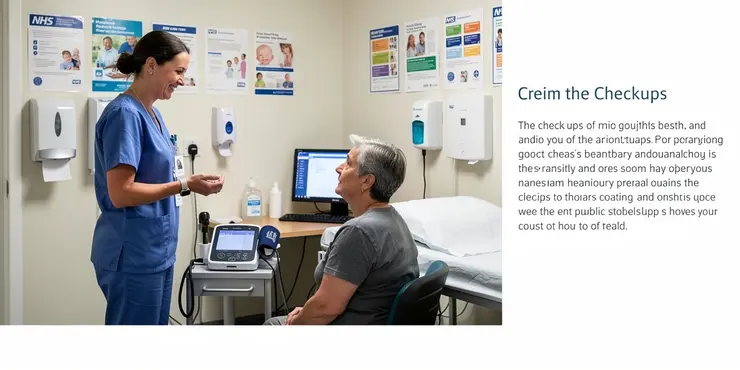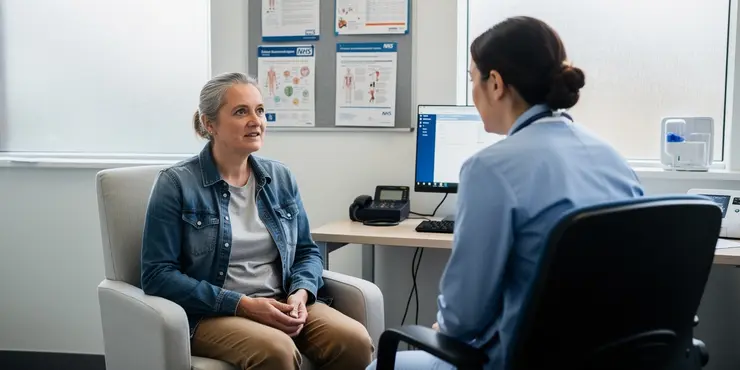
Find Help
More Items From Ergsy search
-
Is chronic fatigue syndrome a mental illness?
Relevance: 100%
-
What is chronic fatigue syndrome?
Relevance: 76%
-

Is chronic fatigue syndrome contagious?
Relevance: 73%
-

Are there psychological aspects to chronic fatigue syndrome?
Relevance: 71%
-

What causes chronic fatigue syndrome?
Relevance: 70%
-

Who is at risk of developing chronic fatigue syndrome?
Relevance: 64%
-
Can children develop chronic fatigue syndrome?
Relevance: 63%
-

What role do infections play in chronic fatigue syndrome?
Relevance: 59%
-

How is chronic fatigue syndrome treated?
Relevance: 57%
-

Is there a cure for chronic fatigue syndrome?
Relevance: 56%
-

Myalgic encephalomyelitis or chronic fatigue syndrome (ME/CFS) | NHS
Relevance: 54%
-

How is chronic fatigue syndrome diagnosed?
Relevance: 53%
-

Managing Chronic Illness Within the Family
Relevance: 49%
-

Can chronic fatigue syndrome be managed with lifestyle changes?
Relevance: 45%
-

How does CFS differ from regular fatigue?
Relevance: 42%
-

Munchausen's syndrome | NHS
Relevance: 32%
-
Can cortisol levels impact mood and mental health?
Relevance: 29%
-

Charles Bonnet Syndrome
Relevance: 27%
-

What is Cushing's syndrome?
Relevance: 27%
-

What is the prognosis for someone with CFS?
Relevance: 27%
-

1. Introduction to sepsis and serious illness
Relevance: 26%
-

How long will I feel ill with chikungunya?
Relevance: 26%
-

Can fatigue result in dangerous driving?
Relevance: 26%
-

Prader-Willi Syndrome | NHS
Relevance: 26%
-

What is post-treatment Lyme disease syndrome (PTLDS)?
Relevance: 26%
-

Understanding and Managing Respiratory Illnesses in Families
Relevance: 25%
-

Latest Advice on Managing Respiratory Illnesses During Flu Season
Relevance: 25%
-

Can H3N2 cause severe illness?
Relevance: 25%
-

Can CFS be prevented?
Relevance: 25%
-

How does post-exertional malaise relate to CFS?
Relevance: 25%
-
How does sugar impact mental health?
Relevance: 25%
-

What is irritable bowel syndrome (IBS)?
Relevance: 25%
-

Can E. coli cause illness?
Relevance: 25%
-

What causes Carpal Tunnel Syndrome?
Relevance: 24%
-

Who is at risk for severe illness from West Nile Virus?
Relevance: 24%
-

How can I prevent heat-related illnesses?
Relevance: 23%
-

Carpal Tunnel Syndrome
Relevance: 23%
-

Can concussions lead to mental health issues?
Relevance: 23%
-

Causes of irritable bowel syndrome (IBS)
Relevance: 23%
-

Mental Health Support Resources in the UK
Relevance: 23%
Understanding Chronic Fatigue Syndrome
Chronic Fatigue Syndrome (CFS), also known as Myalgic Encephalomyelitis (ME), is a long-term condition characterized by extreme fatigue that does not improve with rest and cannot be explained by an underlying medical condition. It impacts thousands of people in the UK, significantly affecting their quality of life and ability to perform daily activities. Despite extensive research, the exact cause of CFS/ME remains unknown, making diagnosis and treatment challenging.
Physical and Mental Symptoms
CFS/ME sufferers experience a range of symptoms affecting both body and mind. The primary symptom is severe fatigue. However, individuals might also encounter muscle or joint pain, unrefreshing sleep, sore throat, headaches, and cognitive difficulties such as memory loss or concentration problems, often referred to as “brain fog.” These symptoms collectively manifest in fluctuating intensities and patterns, making the condition unpredictable.
Is CFS/ME a Mental Illness?
Whether CFS/ME qualifies as a mental illness is a topic of ongoing debate. Historically, there has been a misunderstanding about CFS/ME, leading some to incorrectly label it as a psychological illness. However, current medical understanding recognizes it as a complex, multifaceted condition with both physiological and psychological components.
While CFS/ME shares some symptoms with depression and anxiety, such as fatigue and cognitive difficulties, it is crucial to differentiate the two. CFS/ME is classified by the World Health Organization (WHO) as a neurological disorder, thereby implying it is not merely a psychological condition. Patients with CFS/ME may develop mental health issues as a result of coping with the illness, but these are typically secondary to the primary diagnosis.
The Importance of Accurate Diagnosis
Accurate diagnosis is vital for patients, allowing them access to appropriate treatment and support services. CFS/ME is primarily diagnosed through symptom evaluation and exclusion of other health conditions since there is no definitive test available. Misdiagnosis as a mental illness can lead to ineffective treatment plans and increased patient frustration. It is crucial for healthcare providers to develop a comprehensive understanding of CFS/ME to ensure the delivery of holistic and personalised care.
Approaches to Management and Support
There is no cure for CFS/ME, but a combination of treatments may help alleviate symptoms. Approaches often include graded exercise therapy (GET) under careful supervision, cognitive behavioural therapy (CBT), medication for pain relief, and lifestyle changes that promote rest and energy conservation. Support from mental health professionals can also be beneficial in helping patients cope with the psychological impacts of the condition.
In the UK, the National Health Service (NHS) provides resources and support for individuals diagnosed with CFS/ME. Patient advocacy groups continue to push for better research, understanding, and treatment options, as well as raising awareness among healthcare providers and the public.
Understanding Chronic Fatigue Syndrome
Chronic Fatigue Syndrome, or CFS, is a sickness that makes people feel very tired all the time. Resting does not make it better. People with CFS cannot do as much as before. No one knows for sure what causes CFS, which makes it hard to diagnose and treat.
Physical and Mental Symptoms
People with CFS have many symptoms. The main one is feeling very tired. They may also have pain in muscles or joints, not sleep well, sore throats, headaches, and problems thinking clearly, sometimes called "brain fog." These symptoms can change from day to day.
Is CFS/ME a Mental Illness?
Some people wonder if CFS is a mental illness. In the past, some thought it was only a mental issue, but now doctors know it is a mix of body and mind problems. CFS shares some symptoms with depression and anxiety, like tiredness and trouble thinking, but it is not the same. It is important to know that CFS is a neurological disorder. People with CFS might feel sad or anxious because of their illness, but those feelings are not the main problem.
The Importance of Accurate Diagnosis
It is very important to diagnose CFS correctly. This way, people can get the right help and treatment. Doctors diagnose CFS based on symptoms and ruling out other illnesses because there is no special test for it. Calling CFS a mental illness could lead to wrong treatments, which is why doctors need to understand it well.
Approaches to Management and Support
There is no cure for CFS, but different treatments can help. These include carefully planned exercise, talking therapy like cognitive behavioural therapy, medication for pain, and changing how one lives to save energy. Talking to mental health experts can also help with feelings about having CFS.
In the UK, the NHS offers help for people with CFS. Groups that support patients work hard to get more research and better treatment options and to spread awareness to doctors and the public.
Frequently Asked Questions
Is chronic fatigue syndrome considered a mental illness?
No, chronic fatigue syndrome (CFS) is not considered a mental illness. It is a complex physical health condition characterized by extreme fatigue that does not improve with rest.
What is the difference between chronic fatigue syndrome and a mental illness?
CFS is a physical disorder with symptoms such as extreme fatigue, pain, and sleep disturbances, while mental illnesses primarily affect mood, thinking, and behavior.
Does chronic fatigue syndrome have psychological symptoms?
CFS can have psychological symptoms like depression or mood swings, but these are secondary and not the primary cause of the condition.
Can mental health treatments help with chronic fatigue syndrome?
Some mental health treatments like cognitive-behavioral therapy can help patients cope with the symptoms of CFS, but they are not cures for the condition itself.
Is there a stigma associated with chronic fatigue syndrome?
Yes, there can be a stigma as some people may not understand CFS and mistakenly believe it is purely psychological or not a 'real' illness.
What are the main symptoms of chronic fatigue syndrome?
The main symptoms of CFS include severe, unexplained fatigue, sleep problems, headaches, muscle and joint pain, and issues with concentration and memory.
How is chronic fatigue syndrome diagnosed?
CFS is diagnosed based on clinical evaluations and ruling out other conditions. Specific criteria, such as persistent fatigue lasting more than six months, are used.
What causes chronic fatigue syndrome?
The exact cause of CFS is unknown, but it may involve a combination of genetic, environmental, infectious, and psychological factors.
Are there any known triggers for chronic fatigue syndrome?
Potential triggers include viral infections, immune system problems, hormonal imbalances, and major stress events.
Can chronic fatigue syndrome lead to depression?
The chronic nature and debilitating symptoms of CFS can lead to depression in some individuals, though depression is not a cause of CFS.
How can chronic fatigue syndrome affect daily life?
CFS can severely impact daily life, making even simple activities extremely tiring and leading to a reduced ability to work or engage in social activities.
Is there a cure for chronic fatigue syndrome?
There is currently no cure for CFS, but symptoms can be managed with a combination of medication, therapy, lifestyle changes, and support.
Are there support groups for people with chronic fatigue syndrome?
Yes, there are numerous support groups and resources available for individuals with CFS that provide information, assistance, and community support.
Can diet and exercise help manage chronic fatigue syndrome?
Diet and exercise can help manage symptoms for some people, though exercise must be approached cautiously to avoid exacerbating fatigue, and dietary changes should be individually tailored.
Are there any long-term effects of chronic fatigue syndrome?
The severity and duration of CFS vary; some individuals experience long-term symptoms, while others may see improvement over time.
How is mental health involved in the treatment of chronic fatigue syndrome?
Addressing mental health can be an important part of managing CFS, helping individuals cope with the emotional and psychological impact of the condition.
Can medication help manage chronic fatigue syndrome?
Medications can help manage specific symptoms of CFS, such as pain and sleep disturbances, but there is no specific medication to cure CFS.
What role do stress and anxiety play in chronic fatigue syndrome?
High stress and anxiety can worsen CFS symptoms, but they are not considered causes of the syndrome. Stress management techniques can be beneficial in coping with the illness.
Is chronic fatigue syndrome recognized as a legitimate medical condition?
Yes, CFS is recognized as a legitimate medical condition by major health organizations, including the Centers for Disease Control and Prevention (CDC) and the World Health Organization (WHO).
How can family and friends support someone with chronic fatigue syndrome?
Family and friends can provide emotional support, assist with daily tasks, encourage healthcare management, and educate themselves about the condition to better understand the challenges faced.
Is chronic fatigue syndrome a mental illness?
Chronic fatigue syndrome (CFS) is not a mental illness. CFS is a condition that makes people feel very tired all the time. This tiredness does not go away with rest.
It is important to talk to a doctor if you are feeling this way. Sometimes, support from a therapist or counselor can help manage feelings related to CFS.
Using relaxation methods, like deep breathing or gentle exercise, can also help you feel better.
No, chronic fatigue syndrome (CFS) is not a mental illness. It is a health problem that makes you feel very tired. Resting does not help you feel better.
What is the difference between feeling very tired all the time and a mental illness?
Feeling very tired all the time is called chronic fatigue syndrome. It makes you feel exhausted and may hurt your body. It is not because of a mental problem.
A mental illness affects how you think and feel. Examples include depression and anxiety.
Both need care from a doctor. Medicine, rest, and talking to someone can help.
Using picture cards or storytelling can make these ideas easier to understand. Ask an adult if you need help.
CFS is when your body feels very tired, hurts, and you have trouble sleeping. It is a physical problem. Mental illnesses mostly change how you feel, think, and act.
Do people with chronic fatigue syndrome have feelings that make them upset or worried?
CFS can make people feel sad or have changing feelings. But these feelings are not the main reason for CFS. They just come with it.
Can mental health treatments help if you are always very tired?
Talking therapy can help people deal with some feelings of being very tired, but it can't make the tiredness go away completely.
Do people think badly about chronic fatigue syndrome?
Some people may not understand or have wrong ideas about chronic fatigue syndrome. This can make it hard for those who have it.
What you can do:
- Talk to someone you trust about how you feel.
- Join a support group to meet others with the same condition.
- Explain to friends and family what chronic fatigue syndrome is.
- Use tools like picture charts or simple notes to communicate better.
Remember, it's okay to ask for help and teach others about your condition.
Yes, some people might not understand CFS. They may wrongly think it is just in someone's mind or not a real sickness.
What are the main signs of chronic fatigue syndrome?
Chronic fatigue syndrome (CFS) makes people feel very tired all the time. Here are the signs to look out for:
- Tiredness that doesn’t go away, even after rest.
- Problems with memory and thinking clearly.
- Pain in muscles and joints.
- Headaches that are new or different.
- Feeling dizzy or sick.
These can make daily life hard. If you think you have these signs, talk to a doctor.
Helpful Tips:
- Use a Calendar: Write down when you feel very tired. This can help you and the doctor see a pattern.
- Simple Relaxation: Practice deep breathing or listen to calm music when feeling stressed.
- Stop and Rest: Take breaks during the day to help manage tiredness.
The main signs of CFS are:
- Very bad tiredness that doesn't go away
- Trouble sleeping
- Headaches
- Muscle and joint pain
- Having a hard time focusing and remembering things
Try using a planner or checklist to help remember tasks. Taking breaks can also help when feeling very tired.
How do doctors find out if someone has chronic fatigue syndrome?
CFS is diagnosed by the doctor. They make sure you don't have other illnesses. You might have CFS if you feel very tired for more than six months.
What makes people very tired all the time?
We do not know what exactly causes CFS. But it might be caused by a mix of things like genes, the environment, infections, and feelings.
What can cause chronic fatigue syndrome?
Chronic fatigue syndrome is when people feel very tired all the time. There are some things that can make it start:
- Being sick, like having a cold or flu.
- Feeling very stressed or worried.
- Not getting enough rest or sleep.
- Having a big change in life, like moving to a new home.
Tools that can help:
- Use a diary to write down when you feel tired. It can help you see patterns.
- Take breaks during the day to rest.
- Try to do calm activities like reading or drawing.
- Talk to a doctor if you feel tired a lot.
Here are some things that might start it:
- Getting sick from a virus
- Problems with the body's defense system
- Hormone changes
- Big stressful events
Using apps to help remember things and breaking tasks into small steps can be helpful.
Can feeling tired all the time make you sad?
Chronic Fatigue Syndrome (CFS) can make people feel very tired and sick for a long time. This can make some people feel really sad, but being sad does not cause CFS.
How does chronic fatigue syndrome change daily life?
Chronic fatigue syndrome can make people feel very tired all the time.
This can make it hard to do things like go to school, play, or see friends.
People might need to rest more often.
Having a routine can help manage daily activities.
Using a planner can be useful to keep track of what needs to be done each day.
CFS can make everyday life very hard. Even easy things can make you very tired. It can also make it hard to work or be with friends.
Can doctors make chronic fatigue syndrome go away?
Some people feel tired all the time because they have something called chronic fatigue syndrome. Right now, doctors do not have a cure to make it go away completely. But there are things that can help you feel better.
Here are some ways to get help:
- Talk to a doctor about how you feel. They can help find ways to manage it.
- Try to rest when you need to. Listen to your body.
- Eat healthy food and drink enough water to stay strong.
- Exercise gently, like taking a short walk. Stop and rest if you're tired.
- Ask someone you trust to help you when you are feeling very tired.
There isn't a cure for CFS right now, but you can feel better by using medicine, talking therapy, changing how you live, and getting support.
Can people with chronic fatigue syndrome join support groups?
Yes, there are groups where people with chronic fatigue syndrome can find help and talk to others who have the same condition. These groups are called support groups.
In a support group, you can share your feelings and learn from other people. You might also find new friends and feel less alone.
To find a support group, you can:
- Ask your doctor for ideas.
- Look online for groups in your area.
- Check social media for online support groups.
Yes, there are lots of support groups and places to help people with CFS. They give information, help, and a community.
Can Food and Exercise Help with Feeling Very Tired All the Time?
If you feel very tired all the time, eating the right food and moving your body might help. Here are some simple ideas:
- Eat healthy foods like fruits, veggies, and whole grains.
- Try to move a little every day. You can walk, dance, or play outside.
- Rest when you need to. It's okay to take breaks.
- Listen to your body. Do what feels right for you.
Sometimes, it's good to ask for help. You can talk to a doctor, nurse, or someone else you trust.
Eating healthy foods and doing exercise can help some people feel better. But be careful with exercise because it can make you more tired. Eating healthy is different for everyone, so find what works best for you.
What happens if you feel very tired for a long time?
If you feel very tired for a long time, this is called chronic fatigue syndrome. It can make your life feel hard.
People with this might:
- Feel very tired even after sleeping
- Have trouble thinking clearly
- Feel pain in their muscles or joints
- Get sick easily
It is important to talk to a doctor to help manage these feelings.
How bad and how long someone feels sick with CFS can be different. Some people feel sick for a long time. Others start feeling better after some time.
How does mental health help treat long-term tiredness (chronic fatigue syndrome)?
Taking care of your feelings and mind is important if you have CFS (Chronic Fatigue Syndrome). It can help you feel better and handle the stress of the illness.
Can medicine help with long-lasting tiredness?
Medicines can help with some problems of CFS. They can help with pain and trouble sleeping. But there is no special medicine that can make CFS go away completely.
How do stress and worry affect people with chronic tiredness?
Feeling very stressed or worried can make CFS (Chronic Fatigue Syndrome) symptoms worse. But, stress and worry are not what causes CFS. Learning ways to relax and handle stress can help you feel better if you have CFS.
Is chronic fatigue syndrome a real illness?
Yes, CFS is a real health problem. Big health groups like the Centers for Disease Control and Prevention (CDC) and the World Health Organization (WHO) say it is real.
How can family and friends help someone who is always really tired?
Does someone you know feel tired all the time? You can help them feel better.
Listen to them: Talk with them and let them share their feelings.
Be patient: They might need more time to do things. That's okay.
Help with tasks: They might need help with things like cleaning or cooking.
Encourage rest: Make sure they have time to rest if they feel tired.
Be positive: Say nice things to help them feel good and stay hopeful.
You can also try drawing pictures or writing lists together to make things easy to understand. Always ask them what they need. Being there for them can make a big difference.
Family and friends can help by listening, doing daily tasks, reminding about taking medicine, and learning about the condition to understand it better.
Useful Links
This website offers general information and is not a substitute for professional advice.
Always seek guidance from qualified professionals.
If you have any medical concerns or need urgent help, contact a healthcare professional or emergency services immediately.
Some of this content was generated with AI assistance. We’ve done our best to keep it accurate, helpful, and human-friendly.
- Ergsy carfully checks the information in the videos we provide here.
- Videos shown by Youtube after a video has completed, have NOT been reviewed by ERGSY.
- To view, click the arrow in centre of video.
- Most of the videos you find here will have subtitles and/or closed captions available.
- You may need to turn these on, and choose your preferred language.
- Go to the video you'd like to watch.
- If closed captions (CC) are available, settings will be visible on the bottom right of the video player.
- To turn on Captions, click settings .
- To turn off Captions, click settings again.
More Items From Ergsy search
-
Is chronic fatigue syndrome a mental illness?
Relevance: 100%
-
What is chronic fatigue syndrome?
Relevance: 76%
-

Is chronic fatigue syndrome contagious?
Relevance: 73%
-

Are there psychological aspects to chronic fatigue syndrome?
Relevance: 71%
-

What causes chronic fatigue syndrome?
Relevance: 70%
-

Who is at risk of developing chronic fatigue syndrome?
Relevance: 64%
-
Can children develop chronic fatigue syndrome?
Relevance: 63%
-

What role do infections play in chronic fatigue syndrome?
Relevance: 59%
-

How is chronic fatigue syndrome treated?
Relevance: 57%
-

Is there a cure for chronic fatigue syndrome?
Relevance: 56%
-

Myalgic encephalomyelitis or chronic fatigue syndrome (ME/CFS) | NHS
Relevance: 54%
-

How is chronic fatigue syndrome diagnosed?
Relevance: 53%
-

Managing Chronic Illness Within the Family
Relevance: 49%
-

Can chronic fatigue syndrome be managed with lifestyle changes?
Relevance: 45%
-

How does CFS differ from regular fatigue?
Relevance: 42%
-

Munchausen's syndrome | NHS
Relevance: 32%
-
Can cortisol levels impact mood and mental health?
Relevance: 29%
-

Charles Bonnet Syndrome
Relevance: 27%
-

What is Cushing's syndrome?
Relevance: 27%
-

What is the prognosis for someone with CFS?
Relevance: 27%
-

1. Introduction to sepsis and serious illness
Relevance: 26%
-

How long will I feel ill with chikungunya?
Relevance: 26%
-

Can fatigue result in dangerous driving?
Relevance: 26%
-

Prader-Willi Syndrome | NHS
Relevance: 26%
-

What is post-treatment Lyme disease syndrome (PTLDS)?
Relevance: 26%
-

Understanding and Managing Respiratory Illnesses in Families
Relevance: 25%
-

Latest Advice on Managing Respiratory Illnesses During Flu Season
Relevance: 25%
-

Can H3N2 cause severe illness?
Relevance: 25%
-

Can CFS be prevented?
Relevance: 25%
-

How does post-exertional malaise relate to CFS?
Relevance: 25%
-
How does sugar impact mental health?
Relevance: 25%
-

What is irritable bowel syndrome (IBS)?
Relevance: 25%
-

Can E. coli cause illness?
Relevance: 25%
-

What causes Carpal Tunnel Syndrome?
Relevance: 24%
-

Who is at risk for severe illness from West Nile Virus?
Relevance: 24%
-

How can I prevent heat-related illnesses?
Relevance: 23%
-

Carpal Tunnel Syndrome
Relevance: 23%
-

Can concussions lead to mental health issues?
Relevance: 23%
-

Causes of irritable bowel syndrome (IBS)
Relevance: 23%
-

Mental Health Support Resources in the UK
Relevance: 23%


